2025届中考英语一轮复习动词课件(共79张PPT)
文档属性
| 名称 | 2025届中考英语一轮复习动词课件(共79张PPT) |
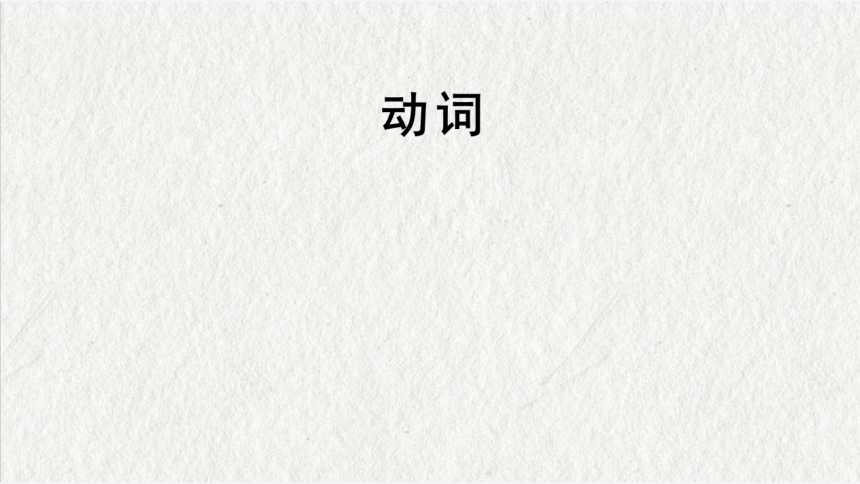
|
|
| 格式 | pptx | ||
| 文件大小 | 8.7MB | ||
| 资源类型 | 教案 | ||
| 版本资源 | 人教新目标(Go for it)版 | ||
| 科目 | 英语 | ||
| 更新时间 | 2024-10-02 11:03:21 | ||
图片预览

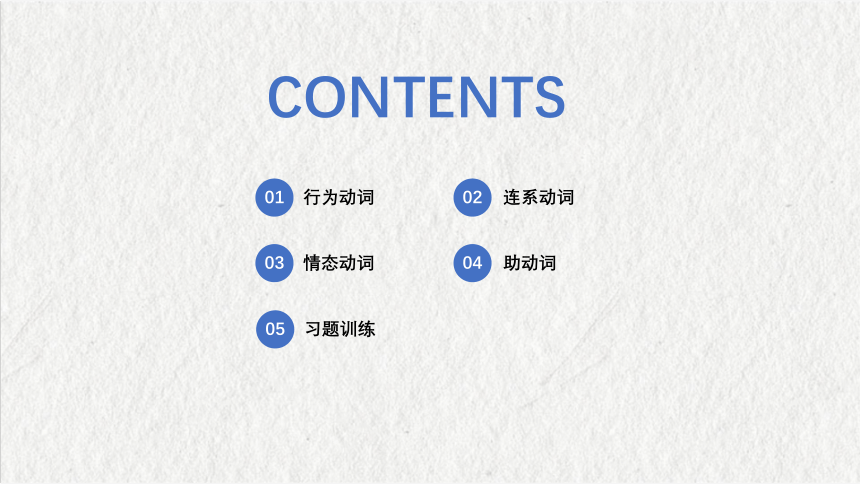
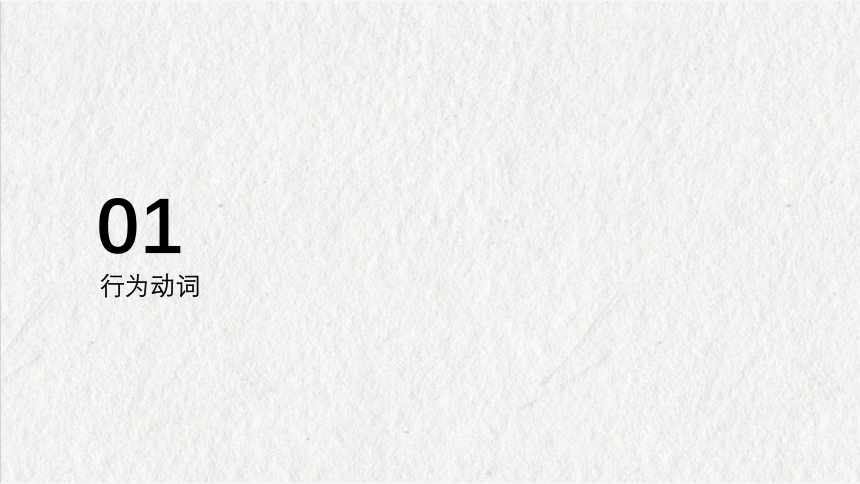
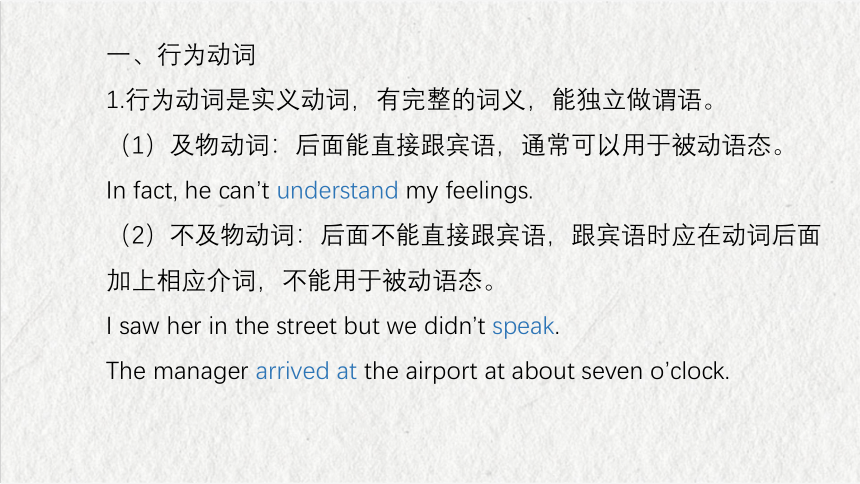
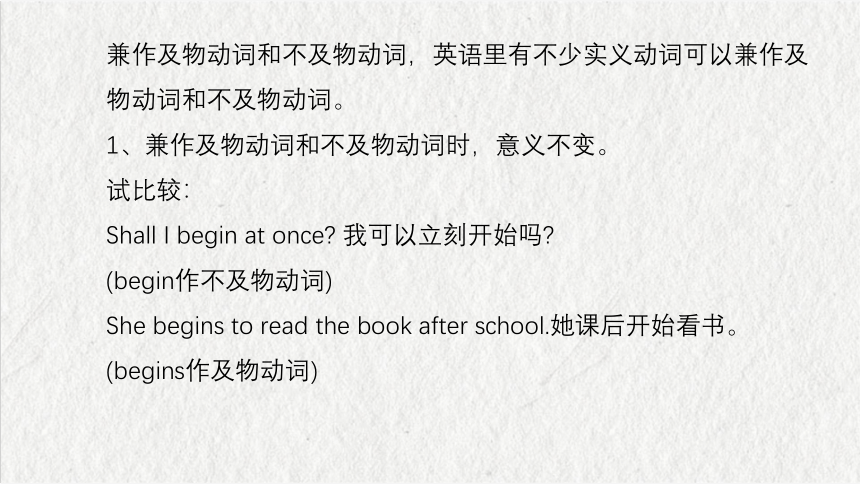
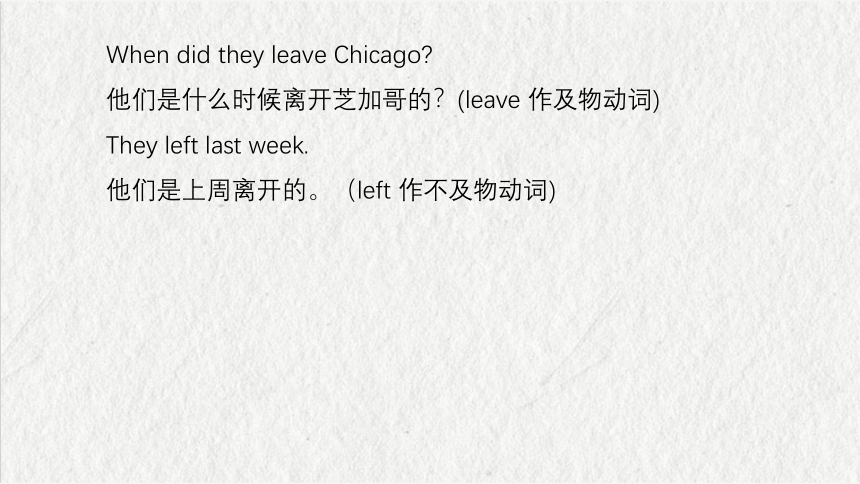
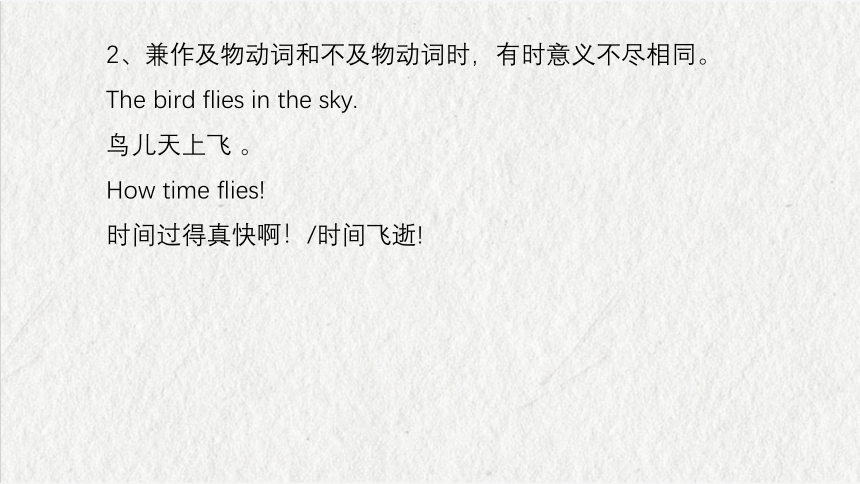
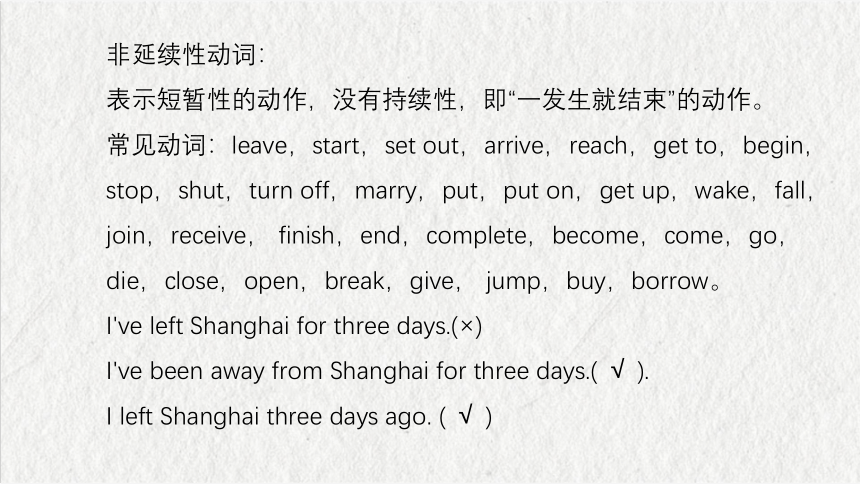
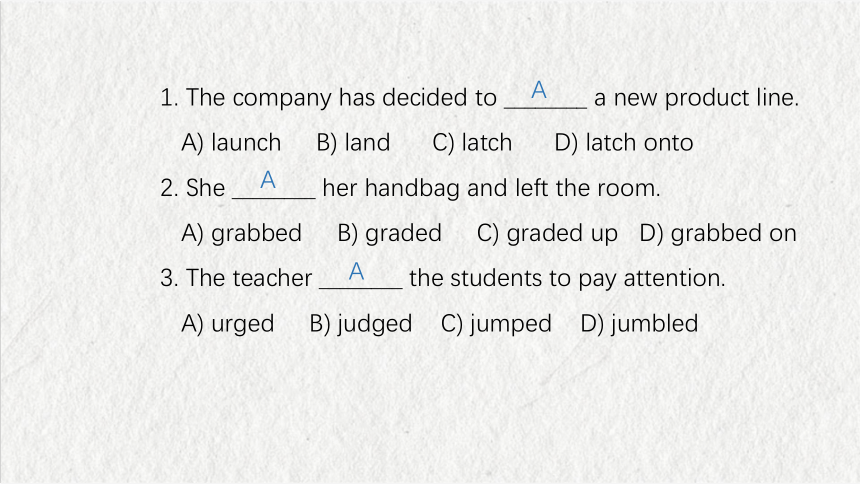
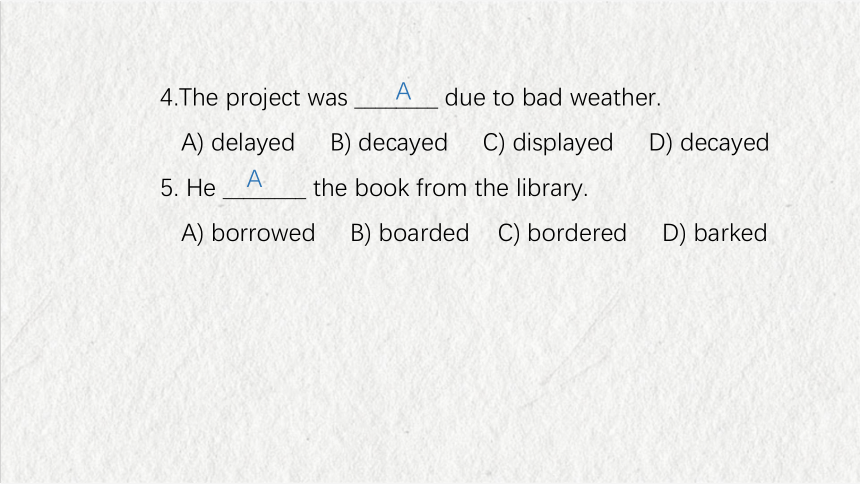
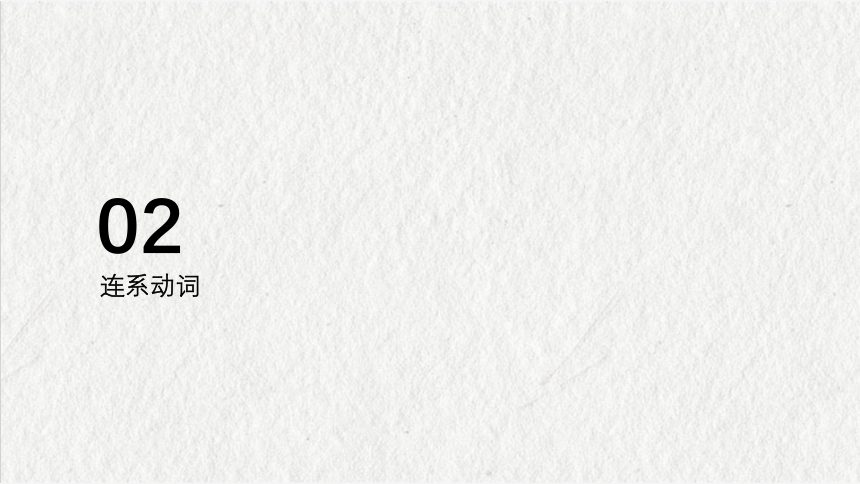

文档简介
(共79张PPT)
动词
CONTENTS
行为动词
01
连系动词
02
情态动词
03
助动词
04
习题训练
05
01
行为动词
一、行为动词
1.行为动词是实义动词,有完整的词义,能独立做谓语。
(1)及物动词:后面能直接跟宾语,通常可以用于被动语态。
In fact, he can’t understand my feelings.
(2)不及物动词:后面不能直接跟宾语,跟宾语时应在动词后面加上相应介词,不能用于被动语态。
I saw her in the street but we didn’t speak.
The manager arrived at the airport at about seven o’clock.
兼作及物动词和不及物动词,英语里有不少实义动词可以兼作及物动词和不及物动词。
1、兼作及物动词和不及物动词时,意义不变。
试比较:
Shall I begin at once 我可以立刻开始吗
(begin作不及物动词)
She begins to read the book after school.她课后开始看书。(begins作及物动词)
When did they leave Chicago
他们是什么时候离开芝加哥的?(leave 作及物动词)
They left last week.
他们是上周离开的。(left 作不及物动词)
2、兼作及物动词和不及物动词时,有时意义不尽相同。
The bird flies in the sky.
鸟儿天上飞 。
How time flies!
时间过得真快啊!/时间飞逝!
非延续性动词:
表示短暂性的动作,没有持续性,即“一发生就结束”的动作。
常见动词:leave,start,set out,arrive,reach,get to,begin, stop,shut,turn off,marry,put,put on,get up,wake,fall,join,receive, finish,end,complete,become,come,go,die,close,open,break,give, jump,buy,borrow。
I've left Shanghai for three days.(×)
I've been away from Shanghai for three days.( √ ).
I left Shanghai three days ago. ( √ )
1. The company has decided to ________ a new product line.
A) launch B) land C) latch D) latch onto
2. She ________ her handbag and left the room.
A) grabbed B) graded C) graded up D) grabbed on
3. The teacher ________ the students to pay attention.
A) urged B) judged C) jumped D) jumbled
A
A
A
4.The project was ________ due to bad weather.
A) delayed B) decayed C) displayed D) decayed
5. He ________ the book from the library.
A) borrowed B) boarded C) bordered D) barked
A
A
02
连系动词
无相派
主要成员
come / become / grow / turn / go/ get
主要技能
无相神功,千变万化
主要特点
表示描述对象从一种状态转变到另一种状态,
江湖人称“变化系动词”
变化系动词become
She becomes angry.
They are becoming taller and taller.
He became a doctor.
身份变化
生理变化
情绪变化
变化系动词grow
It began to grow dark.
The baby grows bigger and older.
逐渐长大
逐渐变黑
变化系动词turn
Leaves turn yellow in the fall.
The weather will soon turn cold.
天气变化
颜色变化
变化系动词go
I hate to go bald.
My phone went wrong.
The boy will go mad,
if you don’t allow him to use the computer.
由多变少
由喜变怒
由好变坏
变化系动词come
My dream finally came true.
Everything came all right.
梦想实现
一切顺利
变化系动词get
It’s getting dark.
The rain is getting heavier and heavier.
逐渐变黑
逐渐变大
When spring comes, trees begin to____ green.
sound
taste
6.
keep
turn
答案:C
简析:当春天来临,树木开始绿。sound 听起来;taste 尝起来;keep 保持;turn 变得。根据常识可知春天树木开始变绿,故选D。
三保持
keep
stay
remain
二表象
seem
appear
一标准
be
(am, is, are
Was, were)
五感官
look, sound
taste, smell
feel
六变化
go, get, grow turn, come become
语法秘籍
如何判断一个词
是不是系动词?
语法归纳
look sound taste smell feel
看起来是 听起来是 尝起来是 闻起来是 感觉是
seem appear
似乎是 似乎是
keep stay remain
一直是 一直是 一直是
come become grow turn go get
变为 变为 变为 变为 变为 变为
所有系动词都含有“是” 的含义
语法归纳
He gets a book.
≠ He is a book.
We stay at home.
= We are at home.
PS. 如果去掉表语,句子意思不完整,变得“没意思”了。
用标准系动词be来替换,句子意思不改变
语法总结
最“不务正业”的动词
是动词,但不承担实际动作意义
可是没它又不行
最敬业的野生“月老”
专业从事为主语和表语牵线搭桥一百年
Everybody ____ contented.
1.
It ____ like a good idea.
2.
You ____ fragrant.
3.
He ____ honest, but he’s a rogue.
4.
This food ____ good.
5.
feels
sounds
smell
looks
tastes
感官系动词辨析
用 look, sound, taste, smell, feel 的适当形式填空
The mother looked ____(angry) at her naughty daughter.
1.
I like listening to light music. It can make me feel ____(relax).
2.
The weather today becomes even ____(bad). Why not take a raincoat
3.
If you don't see the doctor at once, you'll get even ____(ill) later on.
4.
If someone doesn't show good manners to others, he or she is ____(polite).
5.
angry
relaxed
worse
worse
impolite
系动词的用法,后面接形容或者形容词比较级。
My father are a doctor last year.
1
The music hears wonderful.
2.
3.
If you want to lose weight or remain fit, you have to eat less and take more exercise.
4.
There appears to have some problems.
5.
was
sounds
stay
keep
be
We had to be stayed at home to avoid being infected by the virus.
难点:判断是系动词还是实义动词?
He goes to school by bike.
The food goes bad.
He turns around.
The leaf turns yellow.
She fell ill yesterday.
She fell into the river.
实义动词
系动词
实义动词
系动词
系动词
实义动词
Note: 动词+adj.→该动词为系动词
03
情态动词
三、情态动词
情态动词是表示说话人对某一动作或状态的观点或态度的动词,它们本身具有一定的词义,但通常不能独立作谓语,而是与动词原形一起构成谓语。
常用的情态动词有can, could, may, might, must, have to, will, would, shall, should, need, dare等。
1. can, could 的用法
1) 表示能力、技能。
She can swim fast, but I can’t.
Can you swim
2) 表示请求和允许。
---Can I go now
---Yes, you can. ( No, you can’t.)
3) 表示推测,意为“可能”,常用与否定句和疑问句中,此时can’t意为“不可能”。
Can the news be true
This can’t be done by him.
4) 在疑问句中,此时could并不是can的过去式,只是表示委婉的语气。
--- Could you do me a favor
--- Yes, I can. ( No, I’m afraid not.)
5) 表示客观可能性(客观原因形成的能力)。
They’ve changed the timetable, so we can go by bus instead.
This hall can hold 500 people at least.
2. may, might的用法
1) 表请求和允许,might比may语气更委婉,而不是过去式。
You may take whatever you like.
--- May (Might) I smoke here
--- Yes, you can. (No, you can’t/ mustn’t.)
2) 表示推测可能(不用于疑问句),might不是过去式,它所表示的可能性比may小。
He may/ might be busy now.
Your mother may /might not know the truth.
3.must, have to的用法
1) 两词都表示“必须、必要”的意思。have to强调客观需要,must是说话人主观的看法。
My brother was very ill, so I had to call the doctor in the middle of the night.
--- Must we hand in our homework today
---Yes, you must. ( No, you don’t have to/ you needn’t.)
2) have to有人称、数、时态的变化,而must只有一种形式。
He had to look after his sister at home yesterday.
3) 表示推测、可能性(只用于肯定的陈述句)
You’re Tom’s good friend, so you must know what he likes best.
Your mother must be waiting for you now.
4. will, would的用法
1) 表示“将、将要、自愿做……”等。
People will die without air or water.
2) will表示请求、建议等,would更委婉。
Will/Would you please pass me the ball, please
Would you like to go with me
5. shall, should的用法
1) shall的用法
(1) 用于第一、第三人称的疑问句中,表示说话人征求对方的意见或请求。
Shall Tom go there with me tomorrow
Shall I wear the evening dress for your party
(2) 用于第二、第三人称,表示说话人给对方的许诺、命令、警告或威胁。
You shall get an answer from me tomorrow.
2) should的用法
(1) 用来提供帮助、提出建议,要求对方给出意见。
Should I help you with the community affairs
(2) 表达义务、职责等。
I think today’s children should really learn to respect their elders.
6. need, dare的用法
1) need 作情态动词用时, 常用于疑问句、否定句。在肯定句中一般用must, have to, ought to, should代替。
You needn’t come so early.
--- Need I finish the work today
--- Yes, you must. (No, you needn’t.)
2) dare作情态动词用时, 常用于疑问句、否定句和条件从句中, 过去式形式为dared。
How dare you say I’m unfair
He daren’t speak English before such a crowd, dare he
3) dare和 need作实义动词用时,有人称、时态和数的变化。在肯定句中,dare后面常接带to的不定式。在疑问句和否定句中,dare后面可接带to或不带to的不定式。而need后面只能接带to的不定式。
I dare to swim across this river.
He doesn’t dare (to) answer.
He needs to finish his homework today.
4) need后面接doing表示被动:need doing = need to be done.
The washing machine needs repairing. = The washing machine needs to be repaired.
7. had better的用法表示“最好”,相当于一个助动词,只有一种形式,后面要跟动词原形had better (not) do sth.
It is pretty cold. You’d better put on my coat.
(You’d better =You had better)
易错点:
1.can和be able to两者表示能力时用法相同,但can只有原形和过去式两种形式,在其他时态中要用be able to来表示。另外be able to常常指经过努力,花费了时间和劳力之后才能做到某事。
Jim can’t speak English.
I’m sure you’ll be able to finish it quickly.
2.“May I … ”表示请求许可时,否定回答要用mustn’t或can’t,而不能用may not。
---May I go now
---Yes, you may/ can. / No, you mustn’t/ can’t.
易错点:
3. 对must 引导的一般疑问句,肯定回答用must;否定回答用needn’t/ don’t have to.而不能用mustn’t. 因为mustn’t表“禁止”之意。---Must I clean the dining room at once
---Yes, you must. / No, you don’t have to. / needn’t.
4. need 做情态动词,意思为“需要、必须”,通常用于否定句中。You needn’t do all these exercises.
Yuan Longping, a famous Chinese scientist, is now doing research on sea rice.
If farmers ____ start planting rice in salty water, China's food supply will surely rise.
can
can't
1.
must
mustn't
答案:A
考点:can表示能力
简析:如果农民可以开始在盐水中种植水稻,那么中国的食物供应肯定会增加。can用于肯定句,意为“能,可以”,表示能力;must用于肯定句,意为“一定”,表示非常肯定的推测。故选择A。
I ____ go now, or I'll miss my train.
can
might
2.
must
could
答案:C
考点:must表示必须,一定
简析:我现在必须走,否则我将错过我的火车。can能够,可以;might也许,可能;must必须,一定;could可能,能够,可以。结合具体的语境进行判断。因为将会错过火车,所以表达意愿一定是很强烈的,故选择C。
—Must I finish reading the book today, Mr. Brown
—No, you ____. You can finish it in two days.
needn't
mustn't
3.
can't
couldn't
答案:A
考点:Must引导的疑问句的答语
简析:布朗先生,我必须今天读完这本书吗 不,你不必。你可以在两天内完成它。以情态动词must开头的一般疑问句,其否定回答应用needn't或者don't have to。故选择A。
—Finally, they came back.
—They ____ be hungry after such a long walk.
can't
must
4.
needn't
couldn't
答案:B
考点:must表肯定的猜测
简析:最终,他们回来了。 走这么长的路他们一定饿了。 can't 不能;must 必须,一定;needn't 不需要。根据句意“走了这么长的路”而推测出肯定是饿了。故选择B。
—Excuse me, where is the nearest bank
—Go straight ahead; you ____ miss it.
mustn't
can't
5.
needn't
shouldn't
答案:B
考点:can’t表示否定的猜测
简析:打扰一下,(请问)最近的银行在哪里 一直向前走,你不会看不见的。can't 不会,符合句意。mustn't禁止;needn't不必;shouldn't不应该。故选B。
—Is Tom coming by train
—He ____ drive his car. I'm not sure.
can't
may
6.
must
mustn’t
答案:B
考点:may表示猜测
简析:Tom是乘火车来吗 他可能开车来。我不确定。情态动词can’t表示否定的猜测,may表示不确定的猜测,must表示必须,根据句意,应该选B。
Must I go out to have dinner with you, Mum
No, you ____, my dear. You're free to make your own decision.
shouldn't
mustn't
7.
needn't
can’t
答案:C
考点:Must引导的疑问句的答语
简析:妈妈,我必须和你一起出去吃晚饭吗 不,你不必的,亲爱的。你可以自己做决定。以情态动词must开头的一般疑问句,其否定回答应用needn't或者don't have to。故选择C.
—____ I take your order, please
—Yes, I'd like a sandwich.
Must
Need
8.
May
Should
答案:C
考点:may表示可以,请求
简析:请问我能为您点餐吗 好的,我想要一份三明治。must表示必须,need表示需要,should表示应该,may表示“可以”,一般与第一人称单数I搭配使用。故选C。
Mum, may I go out to play basketball for a while
No, you ____. The air outside is too dirty to do sports.
can't
shouldn't
9.
wouldn't
needn't
答案:A
考点:can’t表示不能
简析:妈妈,我能出去打会儿篮球吗 不,你不能。外面的空气太脏了不适合运动。根据句意可知妈妈是不允许的, 此处表达的是“不能”,故选A。
答案:C
考点:may表示推测
简析:Karen会来参加我们的聚会吗 她还没有决定。她可能会来。need 表示需要;must 表示必须;may 表示推测,可能;has to 表示不得不。由语境可知说话人不太确定Karen会不会来,故选C。
—Will Karen come to our party
—She hasn't decided yet.She ____ come.
need
must
10.
may
has to
It’s wrong to talk back to your mother. You ____ apologize to her.
1.
I can’t climb trees now, but I ____ when I was young.
2.
You ____ take me to the airport. My elder brother will give me a ride.
3.
—____ I finish the reading today
—No, you don’t have to.
4.
You ____ watch TV so much. It’s bad for your eyes.
5.
should
could
needn't
must
shouldn't
I was tired but I can’t sleep.
1.
It’s a nice day. Can we go for a walk
2.
We mustn’t decide now. We can decide later.
3.
-Where are you going for your holiday
-I’m not sure. I must go to New York.
4.
-Must I go shopping with you now
-No, you mustn’t. You can stay at home.
5.
couldn't
Shall
needn't
might
needn't
(重点)情态动词+have done:
①must have done “肯定做过”
He didn’t come to work yesterday. He must have been ill.
②can’t/couldn’t have done 不可能做过
Billy is an honest man. He can’t/couldn’t have stolen the money.
③may/might have done “可能做过”
There is a traffic accident. Someone may/might have been injured.
④could have done “本可以做到”(事实上没有做到)
He could have passed the exam, but he didn’t go over his lessons.
⑤should/ought to have done “本应该做过”(事实上没做过)
You should have started earlier, but you didn’t.
⑥needn’t have done “本不必要做”(事实上做了)
You needn’t have woken me up so early, for today is Sunday.
⑦didn’t need to do“本不必要做”(事实上也没去做)
I didn’t need to do the washing-up. My mom did it.
1. –I can find my purse anywhere.
--You _____ have lost it while shopping.
A. may B. can
C. should D. would
2. –Where is my dictionary I remember I put it here yesterday.
--You _____ it in the wrong place.
A. must put B. should have put
C. might put D. might have put
A
D
3. What a pity. Considering his ability and experience, he _____ better.
A.need have done
B.must have done
C.can have done
D.might have done
4. She _____ have left school, for her bike is still here.
A.can’t B.wouldn’t C.shouldn’t D.needn’t
D
A
5. I _____ have been more than six years old when the accident happened.
A.shouldn’t B.couldn’t C.mustn’t D.needn’t
6. He did not regret saying what he did but felt that he _____ it differently.
A.could express B.would express
C. could have expressed D. must have expressed
B
C
7. Jack described his father, who _____ a brave boy many years ago, as a strong-willed man.
A.would be
B.would have been
C.must be
D.must have been
D
04
助动词
四、助动词
助动词本身无意义或意义不完整,只是帮助实义动词完成某些语法功能,它不能单独作谓语。必须和其他动词连用,构成各种时态、语态、否定句和疑问句等结构。
1. Be 动词 be (is, am, are, was, were, being, been)
2. 情态动词 Can/could will/would shall/should
3. 狭义助动词 do (does, did)
4. 完成助动词 have (has, had, having)
1.be 动词做助动词
eg: I am looking at you. 我正在看着你。
I am a teacher. 我是一个老师。
2.情态动词做助动词
①不能单独构成为谓语
She can dance.
(can辅助dance 成为谓语,主语发出的具体的动作是dance跳舞)
②后加动词原形
She can dance.(dance 是动词原形)
(助动词)
(系动词)
③无人称变化
I can swim.
He can swim.
④有本身的含义
can 可以表“能力,可以” / will表“将会”,need表“需要”/must表“必须”
You must eat regularly.
3.狭义助动词:do does did
①用do表强调
eg:Do be careful with that fire.
I do hope you pass the exam.
②用does表强调
eg: He does look very handsome.
③用did表示强调
eg:She did write a letter to you.
4.完成助动词: have has had
①由助动词have 构成现在完成时(现在完成时的结构:have/has + done)
eg: I have read a book these days.
(主语具体发出的动作是read,have 是起辅助作用,帮助read 构成完成状态)
I have a million dollars.(此时have 是实义动词,表示“有”)
②由助动词has构成现在完成时
eg: Tom has taught in this school for ten years.
(主语具体发出的动是taught(taught是teach的过去分词),has是 起辅助作用,帮助taught构成完成状态)
③由助动词had构成过去完成时(过去完成时的结构:had + done)
eg: They had visited a doctor.
(主语具体发出的动作是visted, had 是起辅助作用, 帮助visited 构成完成状态)
有时候为了避免动词的重复,使语言更加简练,常用助动词do的某种形式来代替前面出现的行为动词。
He works even harder than you do.
(do代替work)
=He works even harder than you work.
1.If it is fine tomorrow, we ______ a football match.
A. have B. will have C. has D. shall has
2.When he was at school, he ______ early and take a walk before breakfast.
A. will rise B. shall rise C. should rise D. would rise
3.In the past 30 years China ______ great advances in the socialist revolution and socialist construction.
A. has made B.have made
C.had made D.having made
B
B
D
A
4.I ______ go to bed until I ______ finished my work.
A. don’t/had B. didn’t/have C. didn’t/had D. don’t/have
5.______ you think he ______ back by dinner time
A. Do/have come B. Did/will have come
C. Does/will come D. Do/will have come
C
D
05
习题训练
1.-Lucy, could you give me some suggestions on reading
- OK.My first suggestion is that you have a good reading habit.
A. will B.can C.might D.should
2.-Have you seen my school ID card, mum I can't find it.
- Oh, it be in your bookcase. I saw you put it there last night.
A.can't B.would C.mustn't D.must
3.-Plastic bags are really harmful to our environment.
-You're right.Let's using them.
A. keep B.stop C.start D.do
D
D
B
4.Five-star hotels can first-rate service, making passengers feel at home.
A. provide B. prevent C.protect D.prepare
5.- Some Chinese government officers have turned into live streamers(网络主播).
- Yes. They are trying their best to help local farmers to product sales.
A. improve B.compare C.afford D.produce
A
A
6. Stop playing computer games. It too much of your time.
A.takes B. takes off C. takes back D.takes down
7.-Has Jane done the washing yet
-You cannot her to do such a thing.
A.want B.hope C. expect D.wish
8.-The World Cup is coming. I won't any game!
- I'm looking forward to every match of it, too.
A. miss; to watch B.miss; watching
C.to miss; watch D. to miss; watched
A
C
B
9.The sign“No Littering"shows that we throw rubbish in the park.
A.needn't B.won't C. mustn't D.may not
10.-Must I return this book before Friday, Sir
-No, you , dear. You can keep it for two weeks.
A. can't B. shouldn't C.mustn’t D.needn't
11.-Have you noticed that Anna's great progress in spoken English
- Yes, she sets us a good example. Hard work always .
A. makes a deal B. makes a difference
C.makes a problem D.make a dish
C
D
B
12.She said she returned the book to the library. I'm sure she .
A. takes B.is C.was D.did
13.It's parents' job to a clean and comfortable environment at home their children.
A. support; with B. offer; with
C. give; for D.provide; for
D
D
Thank you for
watching.
动词
CONTENTS
行为动词
01
连系动词
02
情态动词
03
助动词
04
习题训练
05
01
行为动词
一、行为动词
1.行为动词是实义动词,有完整的词义,能独立做谓语。
(1)及物动词:后面能直接跟宾语,通常可以用于被动语态。
In fact, he can’t understand my feelings.
(2)不及物动词:后面不能直接跟宾语,跟宾语时应在动词后面加上相应介词,不能用于被动语态。
I saw her in the street but we didn’t speak.
The manager arrived at the airport at about seven o’clock.
兼作及物动词和不及物动词,英语里有不少实义动词可以兼作及物动词和不及物动词。
1、兼作及物动词和不及物动词时,意义不变。
试比较:
Shall I begin at once 我可以立刻开始吗
(begin作不及物动词)
She begins to read the book after school.她课后开始看书。(begins作及物动词)
When did they leave Chicago
他们是什么时候离开芝加哥的?(leave 作及物动词)
They left last week.
他们是上周离开的。(left 作不及物动词)
2、兼作及物动词和不及物动词时,有时意义不尽相同。
The bird flies in the sky.
鸟儿天上飞 。
How time flies!
时间过得真快啊!/时间飞逝!
非延续性动词:
表示短暂性的动作,没有持续性,即“一发生就结束”的动作。
常见动词:leave,start,set out,arrive,reach,get to,begin, stop,shut,turn off,marry,put,put on,get up,wake,fall,join,receive, finish,end,complete,become,come,go,die,close,open,break,give, jump,buy,borrow。
I've left Shanghai for three days.(×)
I've been away from Shanghai for three days.( √ ).
I left Shanghai three days ago. ( √ )
1. The company has decided to ________ a new product line.
A) launch B) land C) latch D) latch onto
2. She ________ her handbag and left the room.
A) grabbed B) graded C) graded up D) grabbed on
3. The teacher ________ the students to pay attention.
A) urged B) judged C) jumped D) jumbled
A
A
A
4.The project was ________ due to bad weather.
A) delayed B) decayed C) displayed D) decayed
5. He ________ the book from the library.
A) borrowed B) boarded C) bordered D) barked
A
A
02
连系动词
无相派
主要成员
come / become / grow / turn / go/ get
主要技能
无相神功,千变万化
主要特点
表示描述对象从一种状态转变到另一种状态,
江湖人称“变化系动词”
变化系动词become
She becomes angry.
They are becoming taller and taller.
He became a doctor.
身份变化
生理变化
情绪变化
变化系动词grow
It began to grow dark.
The baby grows bigger and older.
逐渐长大
逐渐变黑
变化系动词turn
Leaves turn yellow in the fall.
The weather will soon turn cold.
天气变化
颜色变化
变化系动词go
I hate to go bald.
My phone went wrong.
The boy will go mad,
if you don’t allow him to use the computer.
由多变少
由喜变怒
由好变坏
变化系动词come
My dream finally came true.
Everything came all right.
梦想实现
一切顺利
变化系动词get
It’s getting dark.
The rain is getting heavier and heavier.
逐渐变黑
逐渐变大
When spring comes, trees begin to____ green.
sound
taste
6.
keep
turn
答案:C
简析:当春天来临,树木开始绿。sound 听起来;taste 尝起来;keep 保持;turn 变得。根据常识可知春天树木开始变绿,故选D。
三保持
keep
stay
remain
二表象
seem
appear
一标准
be
(am, is, are
Was, were)
五感官
look, sound
taste, smell
feel
六变化
go, get, grow turn, come become
语法秘籍
如何判断一个词
是不是系动词?
语法归纳
look sound taste smell feel
看起来是 听起来是 尝起来是 闻起来是 感觉是
seem appear
似乎是 似乎是
keep stay remain
一直是 一直是 一直是
come become grow turn go get
变为 变为 变为 变为 变为 变为
所有系动词都含有“是” 的含义
语法归纳
He gets a book.
≠ He is a book.
We stay at home.
= We are at home.
PS. 如果去掉表语,句子意思不完整,变得“没意思”了。
用标准系动词be来替换,句子意思不改变
语法总结
最“不务正业”的动词
是动词,但不承担实际动作意义
可是没它又不行
最敬业的野生“月老”
专业从事为主语和表语牵线搭桥一百年
Everybody ____ contented.
1.
It ____ like a good idea.
2.
You ____ fragrant.
3.
He ____ honest, but he’s a rogue.
4.
This food ____ good.
5.
feels
sounds
smell
looks
tastes
感官系动词辨析
用 look, sound, taste, smell, feel 的适当形式填空
The mother looked ____(angry) at her naughty daughter.
1.
I like listening to light music. It can make me feel ____(relax).
2.
The weather today becomes even ____(bad). Why not take a raincoat
3.
If you don't see the doctor at once, you'll get even ____(ill) later on.
4.
If someone doesn't show good manners to others, he or she is ____(polite).
5.
angry
relaxed
worse
worse
impolite
系动词的用法,后面接形容或者形容词比较级。
My father are a doctor last year.
1
The music hears wonderful.
2.
3.
If you want to lose weight or remain fit, you have to eat less and take more exercise.
4.
There appears to have some problems.
5.
was
sounds
stay
keep
be
We had to be stayed at home to avoid being infected by the virus.
难点:判断是系动词还是实义动词?
He goes to school by bike.
The food goes bad.
He turns around.
The leaf turns yellow.
She fell ill yesterday.
She fell into the river.
实义动词
系动词
实义动词
系动词
系动词
实义动词
Note: 动词+adj.→该动词为系动词
03
情态动词
三、情态动词
情态动词是表示说话人对某一动作或状态的观点或态度的动词,它们本身具有一定的词义,但通常不能独立作谓语,而是与动词原形一起构成谓语。
常用的情态动词有can, could, may, might, must, have to, will, would, shall, should, need, dare等。
1. can, could 的用法
1) 表示能力、技能。
She can swim fast, but I can’t.
Can you swim
2) 表示请求和允许。
---Can I go now
---Yes, you can. ( No, you can’t.)
3) 表示推测,意为“可能”,常用与否定句和疑问句中,此时can’t意为“不可能”。
Can the news be true
This can’t be done by him.
4) 在疑问句中,此时could并不是can的过去式,只是表示委婉的语气。
--- Could you do me a favor
--- Yes, I can. ( No, I’m afraid not.)
5) 表示客观可能性(客观原因形成的能力)。
They’ve changed the timetable, so we can go by bus instead.
This hall can hold 500 people at least.
2. may, might的用法
1) 表请求和允许,might比may语气更委婉,而不是过去式。
You may take whatever you like.
--- May (Might) I smoke here
--- Yes, you can. (No, you can’t/ mustn’t.)
2) 表示推测可能(不用于疑问句),might不是过去式,它所表示的可能性比may小。
He may/ might be busy now.
Your mother may /might not know the truth.
3.must, have to的用法
1) 两词都表示“必须、必要”的意思。have to强调客观需要,must是说话人主观的看法。
My brother was very ill, so I had to call the doctor in the middle of the night.
--- Must we hand in our homework today
---Yes, you must. ( No, you don’t have to/ you needn’t.)
2) have to有人称、数、时态的变化,而must只有一种形式。
He had to look after his sister at home yesterday.
3) 表示推测、可能性(只用于肯定的陈述句)
You’re Tom’s good friend, so you must know what he likes best.
Your mother must be waiting for you now.
4. will, would的用法
1) 表示“将、将要、自愿做……”等。
People will die without air or water.
2) will表示请求、建议等,would更委婉。
Will/Would you please pass me the ball, please
Would you like to go with me
5. shall, should的用法
1) shall的用法
(1) 用于第一、第三人称的疑问句中,表示说话人征求对方的意见或请求。
Shall Tom go there with me tomorrow
Shall I wear the evening dress for your party
(2) 用于第二、第三人称,表示说话人给对方的许诺、命令、警告或威胁。
You shall get an answer from me tomorrow.
2) should的用法
(1) 用来提供帮助、提出建议,要求对方给出意见。
Should I help you with the community affairs
(2) 表达义务、职责等。
I think today’s children should really learn to respect their elders.
6. need, dare的用法
1) need 作情态动词用时, 常用于疑问句、否定句。在肯定句中一般用must, have to, ought to, should代替。
You needn’t come so early.
--- Need I finish the work today
--- Yes, you must. (No, you needn’t.)
2) dare作情态动词用时, 常用于疑问句、否定句和条件从句中, 过去式形式为dared。
How dare you say I’m unfair
He daren’t speak English before such a crowd, dare he
3) dare和 need作实义动词用时,有人称、时态和数的变化。在肯定句中,dare后面常接带to的不定式。在疑问句和否定句中,dare后面可接带to或不带to的不定式。而need后面只能接带to的不定式。
I dare to swim across this river.
He doesn’t dare (to) answer.
He needs to finish his homework today.
4) need后面接doing表示被动:need doing = need to be done.
The washing machine needs repairing. = The washing machine needs to be repaired.
7. had better的用法表示“最好”,相当于一个助动词,只有一种形式,后面要跟动词原形had better (not) do sth.
It is pretty cold. You’d better put on my coat.
(You’d better =You had better)
易错点:
1.can和be able to两者表示能力时用法相同,但can只有原形和过去式两种形式,在其他时态中要用be able to来表示。另外be able to常常指经过努力,花费了时间和劳力之后才能做到某事。
Jim can’t speak English.
I’m sure you’ll be able to finish it quickly.
2.“May I … ”表示请求许可时,否定回答要用mustn’t或can’t,而不能用may not。
---May I go now
---Yes, you may/ can. / No, you mustn’t/ can’t.
易错点:
3. 对must 引导的一般疑问句,肯定回答用must;否定回答用needn’t/ don’t have to.而不能用mustn’t. 因为mustn’t表“禁止”之意。---Must I clean the dining room at once
---Yes, you must. / No, you don’t have to. / needn’t.
4. need 做情态动词,意思为“需要、必须”,通常用于否定句中。You needn’t do all these exercises.
Yuan Longping, a famous Chinese scientist, is now doing research on sea rice.
If farmers ____ start planting rice in salty water, China's food supply will surely rise.
can
can't
1.
must
mustn't
答案:A
考点:can表示能力
简析:如果农民可以开始在盐水中种植水稻,那么中国的食物供应肯定会增加。can用于肯定句,意为“能,可以”,表示能力;must用于肯定句,意为“一定”,表示非常肯定的推测。故选择A。
I ____ go now, or I'll miss my train.
can
might
2.
must
could
答案:C
考点:must表示必须,一定
简析:我现在必须走,否则我将错过我的火车。can能够,可以;might也许,可能;must必须,一定;could可能,能够,可以。结合具体的语境进行判断。因为将会错过火车,所以表达意愿一定是很强烈的,故选择C。
—Must I finish reading the book today, Mr. Brown
—No, you ____. You can finish it in two days.
needn't
mustn't
3.
can't
couldn't
答案:A
考点:Must引导的疑问句的答语
简析:布朗先生,我必须今天读完这本书吗 不,你不必。你可以在两天内完成它。以情态动词must开头的一般疑问句,其否定回答应用needn't或者don't have to。故选择A。
—Finally, they came back.
—They ____ be hungry after such a long walk.
can't
must
4.
needn't
couldn't
答案:B
考点:must表肯定的猜测
简析:最终,他们回来了。 走这么长的路他们一定饿了。 can't 不能;must 必须,一定;needn't 不需要。根据句意“走了这么长的路”而推测出肯定是饿了。故选择B。
—Excuse me, where is the nearest bank
—Go straight ahead; you ____ miss it.
mustn't
can't
5.
needn't
shouldn't
答案:B
考点:can’t表示否定的猜测
简析:打扰一下,(请问)最近的银行在哪里 一直向前走,你不会看不见的。can't 不会,符合句意。mustn't禁止;needn't不必;shouldn't不应该。故选B。
—Is Tom coming by train
—He ____ drive his car. I'm not sure.
can't
may
6.
must
mustn’t
答案:B
考点:may表示猜测
简析:Tom是乘火车来吗 他可能开车来。我不确定。情态动词can’t表示否定的猜测,may表示不确定的猜测,must表示必须,根据句意,应该选B。
Must I go out to have dinner with you, Mum
No, you ____, my dear. You're free to make your own decision.
shouldn't
mustn't
7.
needn't
can’t
答案:C
考点:Must引导的疑问句的答语
简析:妈妈,我必须和你一起出去吃晚饭吗 不,你不必的,亲爱的。你可以自己做决定。以情态动词must开头的一般疑问句,其否定回答应用needn't或者don't have to。故选择C.
—____ I take your order, please
—Yes, I'd like a sandwich.
Must
Need
8.
May
Should
答案:C
考点:may表示可以,请求
简析:请问我能为您点餐吗 好的,我想要一份三明治。must表示必须,need表示需要,should表示应该,may表示“可以”,一般与第一人称单数I搭配使用。故选C。
Mum, may I go out to play basketball for a while
No, you ____. The air outside is too dirty to do sports.
can't
shouldn't
9.
wouldn't
needn't
答案:A
考点:can’t表示不能
简析:妈妈,我能出去打会儿篮球吗 不,你不能。外面的空气太脏了不适合运动。根据句意可知妈妈是不允许的, 此处表达的是“不能”,故选A。
答案:C
考点:may表示推测
简析:Karen会来参加我们的聚会吗 她还没有决定。她可能会来。need 表示需要;must 表示必须;may 表示推测,可能;has to 表示不得不。由语境可知说话人不太确定Karen会不会来,故选C。
—Will Karen come to our party
—She hasn't decided yet.She ____ come.
need
must
10.
may
has to
It’s wrong to talk back to your mother. You ____ apologize to her.
1.
I can’t climb trees now, but I ____ when I was young.
2.
You ____ take me to the airport. My elder brother will give me a ride.
3.
—____ I finish the reading today
—No, you don’t have to.
4.
You ____ watch TV so much. It’s bad for your eyes.
5.
should
could
needn't
must
shouldn't
I was tired but I can’t sleep.
1.
It’s a nice day. Can we go for a walk
2.
We mustn’t decide now. We can decide later.
3.
-Where are you going for your holiday
-I’m not sure. I must go to New York.
4.
-Must I go shopping with you now
-No, you mustn’t. You can stay at home.
5.
couldn't
Shall
needn't
might
needn't
(重点)情态动词+have done:
①must have done “肯定做过”
He didn’t come to work yesterday. He must have been ill.
②can’t/couldn’t have done 不可能做过
Billy is an honest man. He can’t/couldn’t have stolen the money.
③may/might have done “可能做过”
There is a traffic accident. Someone may/might have been injured.
④could have done “本可以做到”(事实上没有做到)
He could have passed the exam, but he didn’t go over his lessons.
⑤should/ought to have done “本应该做过”(事实上没做过)
You should have started earlier, but you didn’t.
⑥needn’t have done “本不必要做”(事实上做了)
You needn’t have woken me up so early, for today is Sunday.
⑦didn’t need to do“本不必要做”(事实上也没去做)
I didn’t need to do the washing-up. My mom did it.
1. –I can find my purse anywhere.
--You _____ have lost it while shopping.
A. may B. can
C. should D. would
2. –Where is my dictionary I remember I put it here yesterday.
--You _____ it in the wrong place.
A. must put B. should have put
C. might put D. might have put
A
D
3. What a pity. Considering his ability and experience, he _____ better.
A.need have done
B.must have done
C.can have done
D.might have done
4. She _____ have left school, for her bike is still here.
A.can’t B.wouldn’t C.shouldn’t D.needn’t
D
A
5. I _____ have been more than six years old when the accident happened.
A.shouldn’t B.couldn’t C.mustn’t D.needn’t
6. He did not regret saying what he did but felt that he _____ it differently.
A.could express B.would express
C. could have expressed D. must have expressed
B
C
7. Jack described his father, who _____ a brave boy many years ago, as a strong-willed man.
A.would be
B.would have been
C.must be
D.must have been
D
04
助动词
四、助动词
助动词本身无意义或意义不完整,只是帮助实义动词完成某些语法功能,它不能单独作谓语。必须和其他动词连用,构成各种时态、语态、否定句和疑问句等结构。
1. Be 动词 be (is, am, are, was, were, being, been)
2. 情态动词 Can/could will/would shall/should
3. 狭义助动词 do (does, did)
4. 完成助动词 have (has, had, having)
1.be 动词做助动词
eg: I am looking at you. 我正在看着你。
I am a teacher. 我是一个老师。
2.情态动词做助动词
①不能单独构成为谓语
She can dance.
(can辅助dance 成为谓语,主语发出的具体的动作是dance跳舞)
②后加动词原形
She can dance.(dance 是动词原形)
(助动词)
(系动词)
③无人称变化
I can swim.
He can swim.
④有本身的含义
can 可以表“能力,可以” / will表“将会”,need表“需要”/must表“必须”
You must eat regularly.
3.狭义助动词:do does did
①用do表强调
eg:Do be careful with that fire.
I do hope you pass the exam.
②用does表强调
eg: He does look very handsome.
③用did表示强调
eg:She did write a letter to you.
4.完成助动词: have has had
①由助动词have 构成现在完成时(现在完成时的结构:have/has + done)
eg: I have read a book these days.
(主语具体发出的动作是read,have 是起辅助作用,帮助read 构成完成状态)
I have a million dollars.(此时have 是实义动词,表示“有”)
②由助动词has构成现在完成时
eg: Tom has taught in this school for ten years.
(主语具体发出的动是taught(taught是teach的过去分词),has是 起辅助作用,帮助taught构成完成状态)
③由助动词had构成过去完成时(过去完成时的结构:had + done)
eg: They had visited a doctor.
(主语具体发出的动作是visted, had 是起辅助作用, 帮助visited 构成完成状态)
有时候为了避免动词的重复,使语言更加简练,常用助动词do的某种形式来代替前面出现的行为动词。
He works even harder than you do.
(do代替work)
=He works even harder than you work.
1.If it is fine tomorrow, we ______ a football match.
A. have B. will have C. has D. shall has
2.When he was at school, he ______ early and take a walk before breakfast.
A. will rise B. shall rise C. should rise D. would rise
3.In the past 30 years China ______ great advances in the socialist revolution and socialist construction.
A. has made B.have made
C.had made D.having made
B
B
D
A
4.I ______ go to bed until I ______ finished my work.
A. don’t/had B. didn’t/have C. didn’t/had D. don’t/have
5.______ you think he ______ back by dinner time
A. Do/have come B. Did/will have come
C. Does/will come D. Do/will have come
C
D
05
习题训练
1.-Lucy, could you give me some suggestions on reading
- OK.My first suggestion is that you have a good reading habit.
A. will B.can C.might D.should
2.-Have you seen my school ID card, mum I can't find it.
- Oh, it be in your bookcase. I saw you put it there last night.
A.can't B.would C.mustn't D.must
3.-Plastic bags are really harmful to our environment.
-You're right.Let's using them.
A. keep B.stop C.start D.do
D
D
B
4.Five-star hotels can first-rate service, making passengers feel at home.
A. provide B. prevent C.protect D.prepare
5.- Some Chinese government officers have turned into live streamers(网络主播).
- Yes. They are trying their best to help local farmers to product sales.
A. improve B.compare C.afford D.produce
A
A
6. Stop playing computer games. It too much of your time.
A.takes B. takes off C. takes back D.takes down
7.-Has Jane done the washing yet
-You cannot her to do such a thing.
A.want B.hope C. expect D.wish
8.-The World Cup is coming. I won't any game!
- I'm looking forward to every match of it, too.
A. miss; to watch B.miss; watching
C.to miss; watch D. to miss; watched
A
C
B
9.The sign“No Littering"shows that we throw rubbish in the park.
A.needn't B.won't C. mustn't D.may not
10.-Must I return this book before Friday, Sir
-No, you , dear. You can keep it for two weeks.
A. can't B. shouldn't C.mustn’t D.needn't
11.-Have you noticed that Anna's great progress in spoken English
- Yes, she sets us a good example. Hard work always .
A. makes a deal B. makes a difference
C.makes a problem D.make a dish
C
D
B
12.She said she returned the book to the library. I'm sure she .
A. takes B.is C.was D.did
13.It's parents' job to a clean and comfortable environment at home their children.
A. support; with B. offer; with
C. give; for D.provide; for
D
D
Thank you for
watching.
同课章节目录
- 词法
- 名词
- 动词和动词短语
- 动词语态
- 动词时态
- 助动词和情态动词
- 非谓语动词
- 冠词
- 代词
- 数词和量词
- 形容词副词及其比较等级
- 介词和介词短语
- 连词和感叹词
- 构词法
- 相似、相近词比较
- 句法
- 陈述句
- 一般疑问句和否定疑问句
- 特殊疑问句及选择疑问句
- 反意疑问句
- 存在句(There be句型)
- 宾语从句
- 定语从句
- 状语从句
- 主谓一致问题
- 简单句
- 并列句
- 复合句
- 主谓一致
- 主、表语从句
- 名词性从句
- 直接引语和间接引语
- 虚拟语气
- 感叹句
- 强调句
- 倒装句
- 祈使句
- 句子的成分
- 句子的分类
- 题型专区
- 单项选择部分
- 易错题
- 完形填空
- 阅读理解
- 词汇练习
- 听说训练
- 句型转换
- 补全对话
- 短文改错
- 翻译
- 书面表达
- 任务型阅读
- 语法填空
- 其他资料
